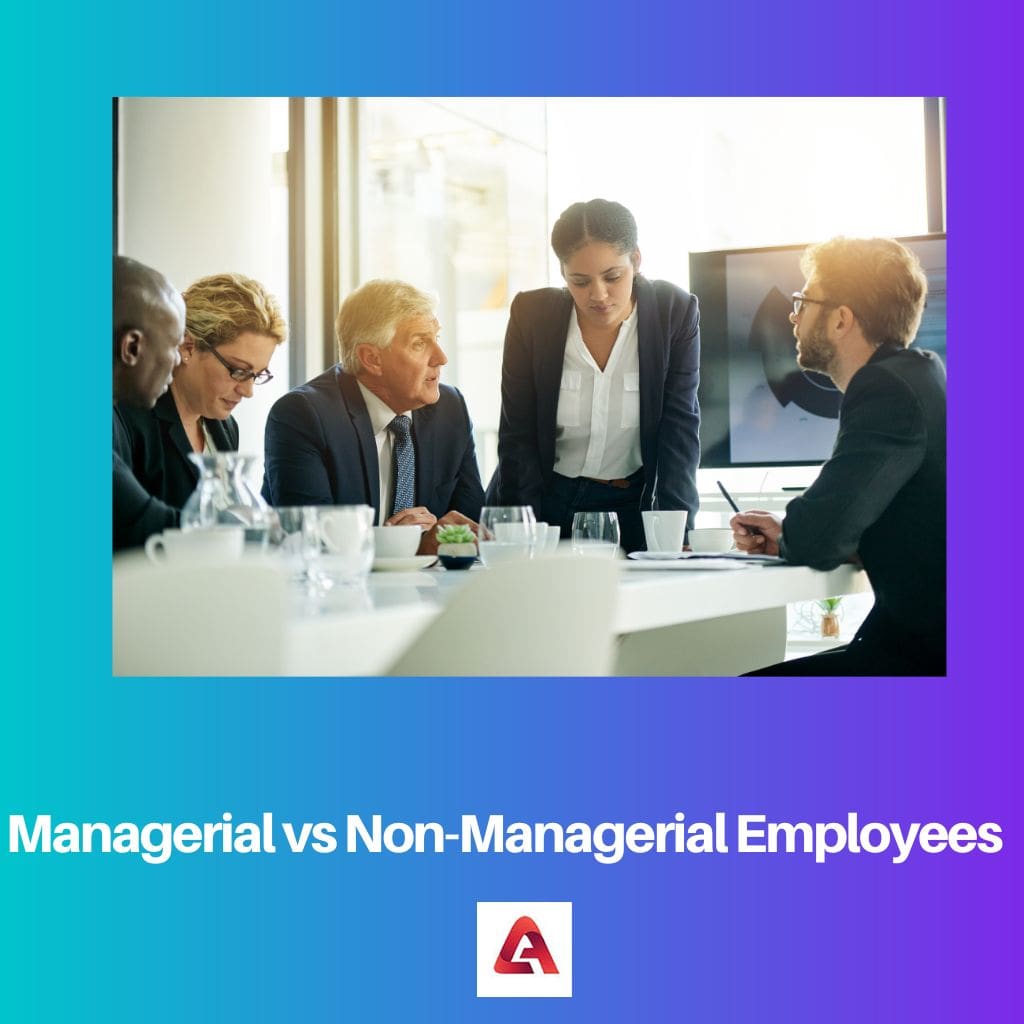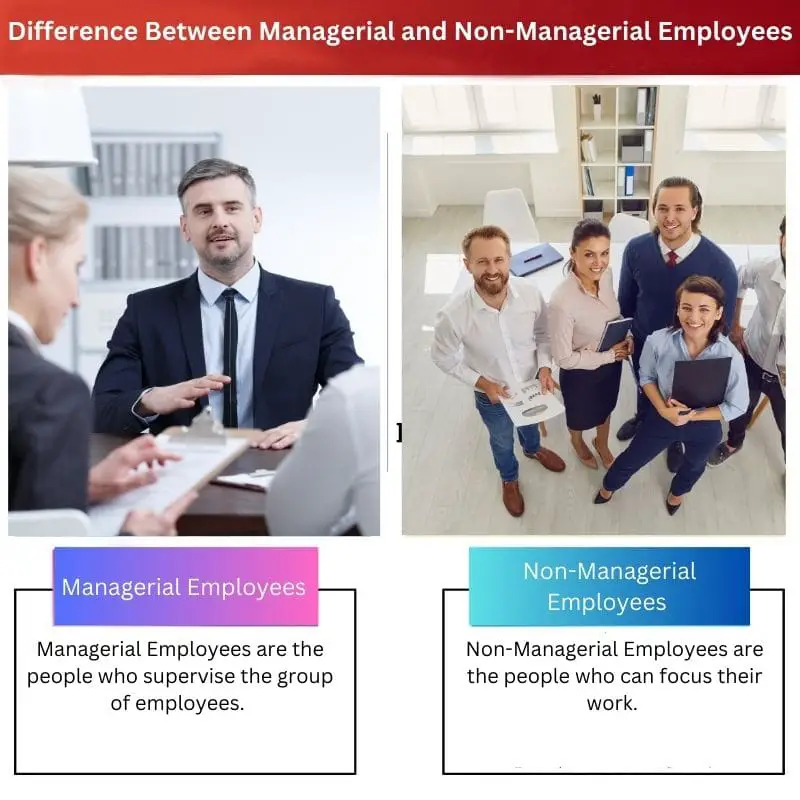People work on their respective posts according to their studies. Employees are of two types they are Managerial and Non-Managerial.
According to their designations in work, the employees come under Managerial and Non-Managerial.
Key Takeaways
- Managerial employees possess decision-making authority and oversee teams or departments.
- Non-managerial employees perform specific tasks within their job scope, focusing on the operational aspect.
- Managerial positions require higher levels of responsibility and include strategic planning, while non-managerial positions emphasize task execution.
Managerial vs Non-Managerial Employees
Managerial employees are responsible for setting goals, allocating resources, making strategic decisions, and managing budgets. Non-managerial employees are responsible for carrying out the organisation’s day-to-day operations but do not have the authority to make strategic decisions or manage other employees.

Managerial Employees are the workers who supervise the work of a group of employees in a company.
Usually, Managerial Employees are the head of the group of employees who manages and allot the related services to subordinates.
An individual in a Managerial position has the right to hire, transfer, suspend, and appreciate all the authorities in a company. They authorize the subordinates in the company.
In Contrast, Non-Managerial Employees are the workers that work for themselves. They only focus on their work and do not interfere with the duty of other employees.
They do not have any right to hire or suspend other employees. They must focus and complete their work.
These employees are the in-charged persons in the executive role that do not focus on other duties in the description.
Comparison Table
| Parameters of Comparison | Managerial Employees | Non-Managerial Employees |
|---|---|---|
| Meaning | Managerial Employees are the people who supervise the group of employees. | Non-Managerial Employees are the people who can focus their work. |
| Duty | The employees in Managerial positions should supervise the duties of the employees, and they have rights on the employees according to the job. | Non-Managerial Employees do not focus on overseeing the employees. |
| Designations | These employees can have the right to suspend, hire, promote, appreciate the work of subordinates. | Non-Managerial Employees do not have rights as Managerial Employees have. |
| Roles | The roles of the Managerial Employees are Disturbance Handler, Negotiators, Entrepreneur, Spokesperson, Monitor and some others. | Some of the roles in the non-Managerial system are Accountants, tellers, cashiers, and some others related to the finance sections. |
| Difference | These employees had heavy work by authorizing and supervising the subordinates. | These employees do not have any relation with other employees, where their main focus is to complete their tasks. |
What are Managerial Employees?
A managerial employee is an employee who has the authority designation in a company.
The Managerial Employees will have the integrity to hire the workers, promote, suspend and appreciate them according to their performance.
These employees will supervise the subordinates related to the work.
Usually, Managerial Employees are the head of a group of employees who manages and allot the related services to the employees.
The employee in the Managerial position should have the responsibilities like planning, leading, using strategies, controlling the employees and some others.
These are the analytical skills that a Managerial employee should adopt, which can manage the work in an organization.
We can find these Managerial Employees in government sectors, non-profitable organizations, businesses, startups, etc.
Some of the positions available in Managerial are
- Spokesperson
- Entrepreneur
- Disturbance Handler
- Negotiators
- Monitors
- General managers and some others.
Apart from the mentioned positions, managerial employees can work with various types of managers.
It is supreme to notice the Managerial roles of an employee where an organization can end the crucial resources that had invested in the organization’s development.
So, the Managerial Employee should undergo the bit part like controlling, guiding, planning, operating and organizing the staff in the organization or company.
Hang on to the situations, and the manager should behave like a leader, boss and figurehead of the company.

What are Non-Managerial Employees?
Non-Managerial Employees are a company’s members who are not involved in the manager’s work. Non-Managerial Employees should focus on their work, where they cannot call for other services.
The Employees do not have any right to hire or suspend other employees.
Non-Managerial employees must focus and complete their work; employees are the in-charged persons in the executive role.
The company will mention that it will not focus on other services in the description. These employees do not have any relation with other employees, and their main focus is to complete their tasks.
Non-Managerial employees do not need to act in another position according to the situation of the organization.
A non-Managerial employee comes under non-management positions that are unrelated to the management work.
The Employees in Non-Management do not need high qualifications compared with managerial employees. An individual can find the below non-Managerial positions in a company,
- Cashiers
- Tellers
- Accountants
- Executive assistants
- Clerks
- Coordinators in human resources
- Copywriters
Above mentioned positions will relate to the finance department, administrative department and marketing. These employees do not have an organisation’s supervising authority or decision-making duty.

Main Differences Between Managerial and Non-Managerial Employees
- Managerial Employees come under the management work in an organization where Non-Managerial Employees are the non-Management related members in a company.
- The qualification of Managerial Employees is high compared with Non-Managerial Employees.
- Managerial Employees have the integrity to hire and suspend an employee, whereas Non-Managerial Employees do not have the authority.
- Managerial Employees will supervise the subordinates, whereas Non-Managerial Employees should focus on their services.
- The General Manager position comes under Managerial, whereas the Cashier role is a non-management position.

- https://journals.sagepub.com/doi/abs/10.1258/0951484041485629
- https://www.emerald.com/insight/content/doi/10.1108/eb053629/full/html
- https://www.researchgate.net/profile/Adnan-Haque/publication/324728417_The_Impact_of_Stressors_on_Organizational_Commitment_of_Managerial_and_Non-Managerial_Personnel_in_Contrasting_Economies_Evidences_from_Canada_and_Pakistan/links/5ae06ca30f7e9b2859470201/The-Impact-of-Stressors-on-Organizational-Commitment-of-Managerial-and-Non-Managerial-Personnel-in-Contrasting-Economies-Evidences-from-Canada-and-Pakistan.pdf





